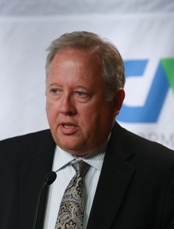
An Americas Agenda for the World
The Inter-American Democratic Charter is a watershed in how the region understands democracy.
On September 4 and 5, 2019, more than 700 participants gathered at the Willard Hotel in Washington, DC to discuss the most pressing issues facing the Western Hemisphere. Another 1,500 participants tuned into the conference online, via live-stream webcasts. Since its inception in 1996, the Annual CAF Conference, a joint initiative by CAF – Development Bank of Latin America, the Inter-American Dialogue, and the Organization of American States (OAS) has become the most important forum for policy makers and analysts, journalists, governments and international organizations, entrepreneurs and investors, and civil society representatives to exchange ideas about the regional situation and propose joint ways to tackle common challenges.
The 23rd edition of the Conference took place amid a complex global and hemispheric situation. The Venezuelan crisis continued to generate concern throughout the region, a trade war between the United States and China threatened to disrupt the world economy, and several Latin American countries were heading to the polls to elect new presidents. Further, most Latin American economies were stagnating, and citizen dissatisfaction was on the rise.
Luis Carranza, president of CAF – Development Bank of Latin America and Michael Shifter, president of the Inter-American Dialogue, welcomed attendees and provided introductory remarks to frame the discussion.
President Carranza highlighted two crucial issues for the future of the hemisphere. The first one is a shifting geopolitical and economic landscape, defined by growing competition between Washington and Beijing. This competition is already having an impact on the global economy and certainly for Latin American countries, which will need to adapt to this changing environment, strengthen their fiscal situation, and reduce their dependency on commodities. Secondly, he described the challenge to democratic regimes posed by the digital revolution and the extended use of social media. Due to this technological change, Carranza argued, the capacity of governments to enact long-term policies and reforms is becoming more limited, and so is the legitimacy of political parties and their ability to aggregate and represent citizens’ views.
In turn, Shifter noted that this conference takes place as Latin America experiences political transition in several countries, including Brazil, Mexico and Argentina, among others. He noted the growth and evolution the CAF Conference itself has undergone in the last 23 years, highlighting the impressive number of participants and the high quality and diversity of the panels.
Video: Introductory Remarks (English), 23 Conferencia CAF - Bienvenida e introducción (audio de la conferencia, sin traducción)
Following the introductory remarks, Tom Shannon, co-chair of the Inter-American Dialogue and former US undersecretary of state for political affairs, moderated a conversation with Michèle Flournoy, former US undersecretary of defense for policy and co-founder and managing partner of WestExec Advisors. The discussion touched on several global security challenges and their impact on the Western Hemisphere broadly, and Latin America in particular.
[caption id="attachment_95187" align="alignleft" width="300"]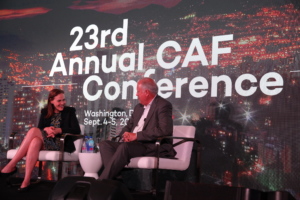 | Rick Reinhard[/caption]
| Rick Reinhard[/caption]
The first topic they explored was the rise of China. Flournoy began by noting that, for decades, US leaders expected Beijing to operate within existing global frameworks. However, we are currently seeing a much more assertive China, especially in East Asia. She urged the United States to devise a comprehensive strategy, one that communicates to Chinese leadership that aggressiveness will be costly, while at the same time provides opportunities for cooperation. Flournoy also warned about the effects of growing Chinese involvement in developing regions, including high indebtedness and the rising influence of Chinese technology corporations.
When asked about the most pressing challenges in the security arena, Flournoy pointed to the development of “deep-fakes”, false online content that closely resembles reality. She warned that fake videos could have major repercussions for democracies because citizens will find it increasingly hard to distinguish fact from fiction. Additionally, she highlighted the danger of cyber intrusion, data breaches, and privacy violations, and urged the US government to create public-private partnerships to design collective responses.
Shannon noted that many Latin American governments perceive US global leadership as declining. Flournoy agreed, and urged the United States to restore some level of bipartisan consensus on foreign policy in order to implement long-term policies and avoid sudden policy swings. She also suggested strengthening US global coalitions and working with allies. When asked about Venezuela, Shannon argued that democracies in the hemisphere must find a common voice in order to have an effective role in solving that country’s political and humanitarian crises.
"We could be going into an era that is particularly dangerous for democratic societies that rely on their publics to have an informed view, to cast votes, and to help make decisions, where we don't know what truth is."
- Michèle Flournoy, former US undersecretary of defense for policy and co-founder and managing partner of WestExec Advisors
Video: A Conversation on Global Challenges and Latin America (English), Conversación con Michèle Flournoy (audio de la conferencia, sin traducción)
The first panel of the day focused on the prospects for trade integration in the Americas. The conversation was moderated by Carla Hills, CEO of Hills & Company, chair emeritus of the Inter-American Dialogue and former US trade representative. In her introductory comments, Hills described a declining interest in trade integration among hemispheric governments, comparing the first Summit of the Americas in 1994 – where the region committed to a Free Trade Area of the Americas – with the current situation.
Marisa Bircher, secretary of international trade of Argentina, noted that more work must be done to bridge productivity and competitiveness gaps in order to prepare regional economies for deeper integration. In the meantime, she described the measures Argentina is taking to facilitate trade, and the country’s ambitious strategy to boost Mercosur – for instance, through agreements with the European Union, the European Free Trade Area, Canada, and others – with a focus on Latin America.
Anabel González, former minister of trade of Costa Rica and non-resident senior fellow at the Peterson Institute, agreed with Hills in that the FTAA would be important, but described it as an “agreement in waiting”. González highlighted that many countries in the region have made significant progress by signing many trade agreements among each other and with outside countries. She added that as US-China competition intensifies, the European Union is a natural partner for Latin America, since it is the number one investor in the hemisphere and an important ally in the reform of the multilateral trade system.
[caption id="attachment_95194" align="alignright" width="300"]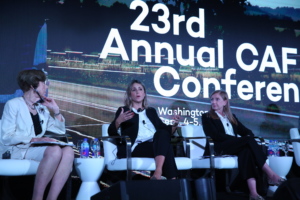 | Rick Reinhard[/caption]
| Rick Reinhard[/caption]
In that sense, Mexican ambassador to the United States Martha Bárcena described the success of the Pacific Alliance, a multilateral platform for economic integration among Mexico, Colombia, Peru and Chile. She urged countries in Latin America to integrate existing trade deals to boost convergence and complementarity. For example, she described the potential for integration between the new US Canada Mexico Agreement (USCMA) and the Pacific Alliance, and the need to communicate this better to decision-makers in the private sector. The ambassador also highlighted the importance of the ratification of USCMA by the United States.
Mauricio Mesquita Moreira, chief economist for the integration and trade sector at the Inter-American Development Bank, emphasized that strengthening convergence between sub-regional agreements is key. However, he also urged the region to work within the World Trade Organization to ensure that the multilateral trade regime remains anchored in the rule of law. In his opinion, Latin American countries must work on trade facilitation and traditional free trade areas, instead of focusing on creating supranational institutions of dubious efficacy. Finally, he warned against “weaponizing” trade agreements, which would erode trade governance and increase uncertainty.
"The governments in the region should all light candles at the door of the WTO to make sure that trade remains governed by the rule of law."
- Mauricio Mesquita Moreira, chief economist for the integration and trade sector at the Inter-American Development Bank
Video: Rethinking a Trade Agenda in the Americas (English), Sesión I: Repensando una agenda comercial en las Américas (audio de la conferencia, sin traducción)
The next panel addressed China’s growing economic presence in Latin America and the Caribbean and discussed potential future scenarios regarding this relationship. The discussion was moderated by Silvia Pavoni, economics editor at The Banker, who began by noting that the relationship has evolved and many countries in the region have become part of Beijing’s Belt and Road Initiative and of the Asian Infrastructure Investment Bank.
Former vice president and foreign minister of Panama, Isabel de Saint Malo, agreed with Pavoni in that China-Latin America relations are constantly evolving: Beijing is no longer interested solely in raw materials, but increasingly is involved in investment and infrastructure as well. She also described rising political and diplomatic efforts by Chinese officials in the region. At the same time, Saint Malo warned that Latin American countries lack a coherent strategy vis-à-vis China, a shortcoming the region will need to resolve in order to take advantage of the opportunities posed by this relationship.
Rosa Ng, former representative of Dominican Republic-China commercial relations, reflected on her experience in that country. She highlighted CAF’s pioneering work in building bridges between China and Latin America and argued that China is filling the void left in Latin America by the United States and Europe, particularly in economic terms. Ng also noted that China-Latin America relations are not new but started more than 200 years ago, when the first Chinese immigrants relocated to the region. In addition, she described changes in China’s development model, with a renewed focus on domestic consumption that could generate new business opportunities for Latin American actors.
[caption id="attachment_95197" align="alignleft" width="300"]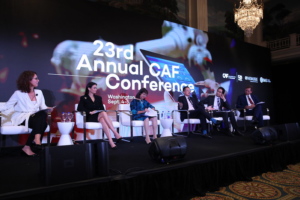 | Rick Reinhard[/caption]
| Rick Reinhard[/caption]
Alex Hao, partner at JunHe Law Offices, said that the 2008-2009 financial crisis marked a turning point for Chinese investments in Latin America. At the same time, he noted that projects by Chinese corporations have slowed down somewhat in recent times, which presents a good opportunity to take stock of the challenges and breakthroughs of the past decade. He also acknowledged that there have been instances of resistance to China-funded projects in some Latin American countries. Regarding recent trade tensions between the United States and China, Hao urged countries to embrace competition and avoid unfair restrictions.
The third speaker was Anton Chan, RMB specialist for financial markets at Standard Chartered Bank. He described Chinese efforts to promote the renminbi as an international reserve currency, including through swap agreements between China’s Central Bank and its counterparts in Chile, Argentina and other Latin American countries. Chan urged Chinese corporations to grasp the nuances of each Latin American country, including political dynamics and cultural characteristics, in order to be more successful in the region. Chan noted that US-China trade tensions are creating positive effects for some Latin American countries, with growing Brazilian exports to China and Mexican exports to the United States.
The director of the Center for Chinese-Mexican Studies at the Universidad Nacional Autónoma de México, Enrique Dussel Peters, argued that Beijing is proposing a globalization with Chinese characteristics, with institutions that challenge the traditional US-led international order . He also described an emerging triangular relationship between Latin American countries, the United States and China, and noted that Washington is no longer capable of implementing unilateral policies in the Western Hemisphere (on diplomatic, economic or even military terms), largely as a result of a growing Chinese presence. To illustrate the importance of China for Latin America, Dussel Peters stated that economic ties with the Asian giant have generated more than 2 million jobs in Latin American countries since the early 2000s.
"The bottom line is that competition between the United States and China in Latin America will be there. It's a matter of how you manage it. Is it malicious or is it beneficial?"
- Alex Hao, partner at JunHe Law Offices
Video: China-Latin America Relations: Beyond Complementarity? (English), Sesión II: Relaciones China-América Latina: ¿Más allá de la Complementariedad? (audio de la conferencia, sin traducción)
The second day of the Conference began with a discussion about political trends in Latin America moderated by Michael Reid, senior editor and columnist at The Economist. Reid’s introductory remarks focused on the growing sense of disenchantment among voters in most of the region, which led to a rise of populist and nationalist factions in recent elections. He argued that economic stagnation plays a significant role in this situation, together with criminality and high levels of corruption. Reid added that most countries in the region are democracies, but face significant governance challenges.
Daniel Zovatto, regional director for Latin America and the Caribbean at the International Institute for Democracy and Electoral Assistance (IDEA), described an electoral super-cycle in Latin America, with 15 countries electing a new president between 2018 and 2019. Zovatto agreed with Reid that economic deceleration in the region is crucial to understanding citizens’ rejection of traditional parties and leaders. He added that satisfaction with democracy has collapsed in the region, from 44 percent to 24 percent. Focusing on Argentina’s case, Zovatto argued that Alberto Fernández (likely to become the next president) will face severe economic restrictions and relative isolation in the region, a context that will demand pragmatism.
Turning to the situation in Brazil, Daniela Pinheiro, editor-in-chief of Revista Época, referred to the recent deterioration of democratic norms in the country. According to Pinheiro, under President Jair Bolsonaro, the Brazilian government is attempting to dismantle most of the policies implemented during previous left-wing governments. However, institutions such as Congress and the judiciary have pushed back against some of the president’s initiatives. Pinheiro described a very dynamic political environment, in which the two main characters are President Bolsonaro and former president Lula, who continues to lead the left despite his imprisonment.
[caption id="attachment_95200" align="alignright" width="300"]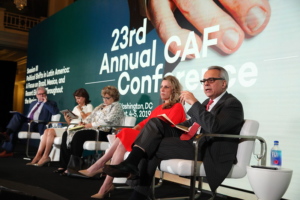 | Rick Reinhard[/caption]
| Rick Reinhard[/caption]
On Mexico, Rossana Fuentes, founder & CEO of Mexico Media Lab, analyzed President Andrés Manuel López Obrador’s leadership. She noted that the president is very popular but faces three very serious challenges: a clear rise in violence, a stagnating economy and growing social polarization. Like what is happening in Brazil, Fuentes argued that López Obrador intends to drastically change many of the institutions and practices established under previous governments and concentrate power in the presidency. Unlike Bolsonaro, however, López Obrador’s political movement (Morena) has a strong majority in both houses of Congress. According to Fuentes, the new Mexican government is devoting unprecedented attention to the country’s impoverished South, which could have positive long-term effects.
Laura Chinchilla, former president of Costa Rica and co-chair of the Inter-American Dialogue, warned about the weaknesses and vulnerabilities of democratic institutions in Latin America. She noted that citizens have increased expectations, but political systems seem incapable of responding to them due to political blockage and stagnating economies. At the same time, Chinchilla criticized the region’s obsession with institutional change and instead urged countries to concentrate on strengthening democratic culture through education. According to Chinchilla, polarization is likely to continue in the region, helped by the expansion of social media and the growing presence of religion in politics.
"This electoral supercycle has taken place in a very adverse context fraught with challenges. In addition to anemic growth, we have experienced social unrest and malaise vis-à-vis traditional parties and politics which has been made worse by corruption and crime."
- Daniel Zovatto, regional director for Latin America and the Caribbean at the International Institute for Democracy and Electoral Assistance (IDEA)
Video: Political Shifts in Latin America: A Focus on Brazil, Mexico, and Recent Elections throughout the Region (English), Sesión III: Cambios políticos en América Latina: Un enfoque en Brasil, México, y las recientes elecciones (audio de la conferencia, sin traducción)
The final panel of the conference dealt with the growing impact of social media and other digital platforms on democratic governance in Latin America. The discussion was moderated by Catalina Botero, dean of the Faculty of Law at the Universidad de los Andes in Colombia. Botero argued that there is an undeniable deterioration of democratic institutions taking place in Latin America and throughout the world, and noted that this trend coincides with the growing impact of social media. Through social media, Botero explained, actors promote misinformation, generate echo chambers that boost polarization, and distort public debate and discussions.
Andrea Bernal, news anchor and director at NTN24, agreed with Botero in that the impact of social media on politics is clear and problematic. Citizen’s trust in the media, the judiciary, and political parties has plummeted, and populist leaders have taken advantage of this crisis to gain power. At the same time, she admitted that social media can serve as a bulwark against government pressures and self-censorship in traditional media. Bernal described an important imbalance: lies are easy to spread on social media, but extremely hard to disprove once they have reached the public sphere.
The special rapporteur for freedom of expression of the Inter-American Commission on Human Rights (IACHR), Edison Lanza, warned that disinformation campaigns are orchestrated by enemies of democratic governance who want to undermine public trust in journalists and the media. At the same time, Lanza urged Latin American countries to preserve democratic freedoms, since restrictions on public discourse and more vigilance over the internet that are supposed to combat misinformation can easily backfire and facilitate censorship. He recommended regulatory changes to ensure net neutrality, promote transparency over electoral spending on social media, and protect personal data.
In response, Crystal Patterson, head of Global Civic Partnerships & Elections at Facebook, described the challenges facing online platforms in this context. There is a clear need to combat misinformation and the spreading of lies that affect political systems, but at the same time Facebook and other companies must respect freedom of speech. Patterson explained that Facebook has taken steps to ensure that the information on its platforms is accurate, for instance through partnerships with journalists and media organizations that conduct real-time fact checking, and with civil society organizations to detect and combat hate speech. Facebook is also working to promote digital literacy so that citizens are more critical when reading news online.
Patrícia Campos Mello, reporter-at-large and columnist at Folha de São Paulo, explained that Whatsapp is the main platform to disseminate false information in Brazil. The encrypted nature of this app makes it impossible to track the origin of misinformation campaigns, and political operatives use easily available software to build large databases that allow them to target thousands of citizens with targeted messages. Campos Mello warned that as digital mercenaries get more access to citizens’ data, they are able to design more specific and targeted misinformation campaigns. Finally, she noted that women are particularly targeted by trolling and other types of online aggression.
[caption id="attachment_95203" align="alignleft" width="300"]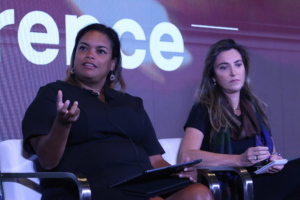 | Rick Reinhard[/caption]
| Rick Reinhard[/caption]
Investigative Unit Editor at La Nación in Argentina, Hugo Alconada Mon, highlighted that disinformation campaigns target a very specific audience: political independents of a certain age with limited experience in using online platforms and, as a result, a lower capacity to discern truth from fabrication. Based on his experience, he recommended combating misinformation campaigns while being careful not to disseminate their lies. He also made the point that traditional media tends to focus on rational arguments, while political decision-making can be highly emotional. This requires new, innovative ways to reach out to citizens, including through social media.
"The passive use of misinformation is an attack on open and pluralistic societies and their democracies."
- Edison Lanza, special rapporteur for freedom of expression of the Inter-American Commission on Human Rights (IACHR)
Video: Social Media, Disinformation, and the Changing Politics of Latin America (English), Sesión IV: Medios sociales, desinformación y política cambiante en América Latina (audio de la conferencia, sin traducción)
To conclude this 23rd CAF Conference, Inter-American Dialogue president Michael Shifter moderated a conversation with Luis Vicente León, president of Datanálisis, about the political and socioeconomic situation in Venezuela.
The first issue they discussed was the emergence of Juan Guaidó as opposition leader in early 2019 and the impact this has had on the political process. León argued that Guaidó reinvigorated the opposition just when Nicolás Maduro was beginning an illegitimate second term as president. Further, Guaidó achieved unprecedented levels of popular support, which allowed him to reunite all opposition factions under one leadership for the first time in many years. At the same time, this generated unrealistic expectations about an imminent collapse of the regime, which did not materialize, hurting Guaidó’s leadership. As a result, most Venezuelans are now skeptical about the possibility of a political change in the short term. Some have pushed Guaidó to welcome an armed intervention from outside powers, an option that León dismissed as impractical and highly unlikely.
[caption id="attachment_95206" align="alignright" width="300"]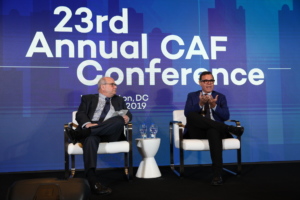 | Rick Reinhard[/caption]
| Rick Reinhard[/caption]
Shifter also asked León about the situation within the armed forces, which have remained loyal to Maduro and form the backbone of his regime. The president of Datanálisis argued that opposition attempts to fracture the military backfired, because the armed forces have remained cohesive. He also noted that the armed forces have obtained massive benefits from Maduro, including direct control over the oil industry and many government agencies. Therefore, in order for the military to turn against the regime the opposition would need to offer much more than vague promises of amnesty in a post-Maduro government.
Regarding the role of the United States, León said that Venezuelans appreciate Washington’s support for the opposition and its insistence on political change. At the same time, he argued that the Trump administration vastly underestimated the resilience of the Maduro regime and insisted on imposing economic sanctions, even when the limits of this strategy became clear. León emphasized that economic sanctions have not weakened the Maduro regime and might even strengthen it in the long term: as in Cuba, Zimbabwe or North Korea, in a ravaged economy, an authoritarian regime turns into the only distributor of essential goods, which allows it to maintain political control.
"People still like Guiadó, but the number of people who think that his plan is doable, that it is ripe and ready, and that change will happen in the short term has waned since January 2019."
- Luis Vicente León, president of Datanálisis
Video: Whither Venezuela? A Conversation with Luis Vicente León (English), ¿Venezuela, hacia dónde se dirige? (audio de la conferencia, sin traducción)
The Inter-American Democratic Charter is a watershed in how the region understands democracy.
Summary of the XIV Annual CAF Conference
Regional integration, social inclusion, and the need for a more competitive business climate—discussed at the XVIII Annual CAF Conference
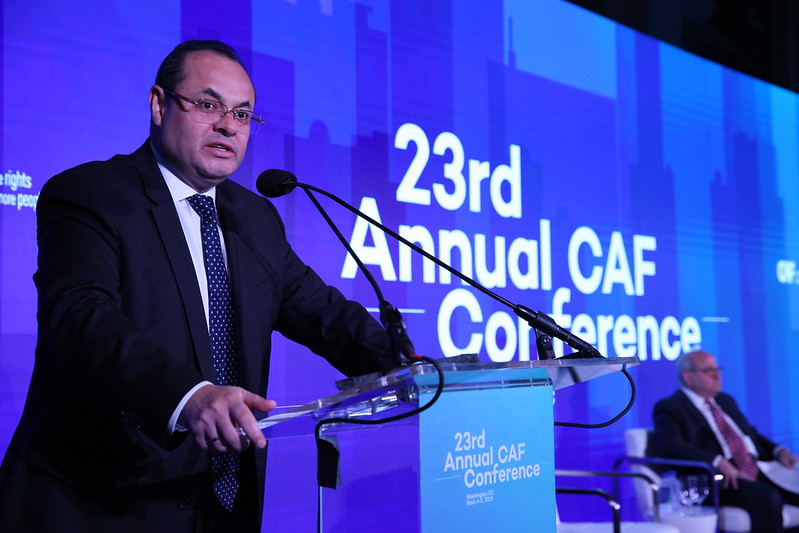 Rick Reinhard
Rick Reinhard
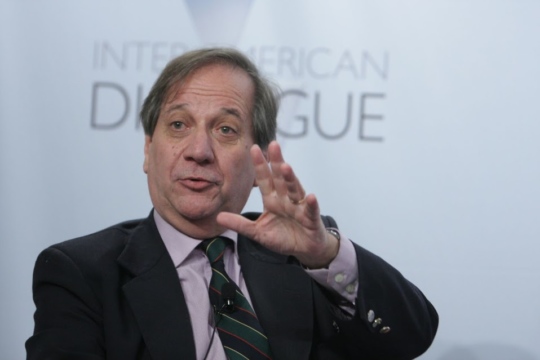
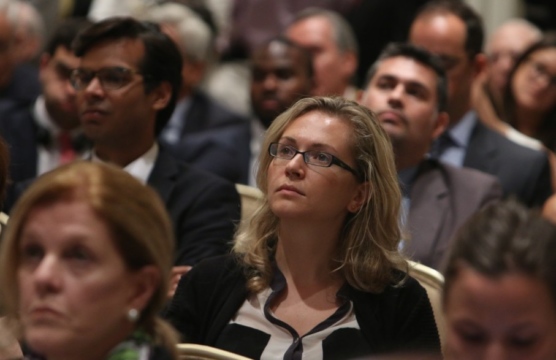 Video
Video